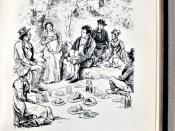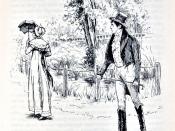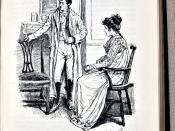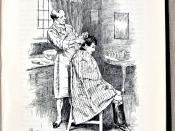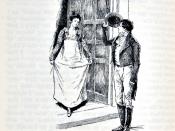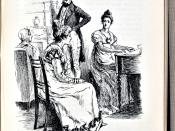As To Her Illness, Nothing of Course: Psychosomatic Illness in Austen?s Emma Even the inattentive reader notices a certain satirical and comedic element the treatment of various illnesses in Emma, especially as depicted through the characterization of Mr. Woodhouse. But upon closer examination, the careful reader realizes that many characters, even and especially Mr. Woodhouse, exhibit signs of illness self-inflicted, illness as a product of a psychosomatic state, or even hypochondria.
Mr. Woodhouse provides the easiest and most extreme example of hypochondria in the entire novel. Indeed, we learn very early, not only that his stomach ?could bear nothing rich,? but that he would gladly counsel others on health generally: ?What was unwholesome to him, he regarded as unfit for everybody? (14). In itself this does not seem odd, but the reader must necessarily find it comedic that Mr. Woodhouse regards a wedding cake with ?great distress,? consults an apothecary about it, and even ?earnestly tried to dissuade [the partygoers] from having wedding cake at all, and when that proved vain, as earnestly tried to prevent anybody?s eating it?(14-15).
These passages set the stage for obvious satirical characterization, as none but the stodgiest and laughable old man would honestly disallow cake at a wedding. But the narrator gives the cake eaters a last triumphant laugh: ?There was a strange rumour in Highbury of all the little Perrys being seen with a slice of Mr. Weston?s wedding cake in their hands; but Mr. Woodhouse would never believe it?(15).
Aside from the early introduction, Woodhouse is satirized even further in his ramblings over Isabella and the health of her children, and in his discussions with her regarding their opposing apothecaries. We learn here of his strange penchant for gruel and his love and high friendship for a doctor, Mr. Perry, who ?is bilious, and has not time to take care of himself?(84). Who would take seriously a bilious doctor? And, similar to the scene in which Woodhouse admonishes wedding cake, he is later depicted satirically in his opposition, for reasons of health, against a ball, and his eventual dissuasion by Frank Churchill?s persistence. In all of these scenes Mr. Woodhouse is made to look like nothing more than a doting, hypochondriacal old gentleman, to be honored but hardly taken seriously.
The first instance in which a specific illness bears upon the plot, however, regards Harriet and her relationship with Mr. Elton. Specifically, Harriet must miss the Christmas Eve dinner at Randalls, because ?she had gone home so much indisposed with a cold??(85). While we have no direct reason to regard Harriet?s fever and ?bad sore throat? with suspicion, we do question why Mr. Perry, as so often is the case, is merely ?talked of,? but never appears on the scene (85). And, given the general circumstance of the events surrounding Harriet?s illness, the reader is naturally curious. Is it unlikely that a young, nervous, female outsider to Highbury aristocracy might not develop some sickness as a result of excitement in the anticipation of her first meeting with a potential suitor? Are not the stakes too high for young Harriet, in that she has so much riding on Mr. Elton?s (alleged) courtship, that she might naturally become sick? Certainly Harriet?s natural temperament evidences that the illness is psychosomatic, in that we later find her extremely upset in the slightest situations (e.g. her meeting with Mr. Martin and his sister) and see her give way to extreme physical reactions, as when she faints after a confrontation with ?gypsies.? Jane Fairfax?s illness is not dissimilar to Harriet?s, except that we have more direct evidence indicating that it is either faked or psychosomatic entirely. Much like Harriet, Jane?s illness arises within the context of a situation of stress. She is to become governess for the Smallridges, which is a major difference in station from the alternative: to marry Frank Churchill. Jane apparently suffers from ?severe headaches,? and a ?nervous fever,? as reported by Mr. Perry himself. On the other hand, ?her health seemed for the moment completely deranged?appetite quite gone?? which indicates both in (figurative) language and content that the illness may be psychosomatic (307). Jane?s illness results, of course, in the delay of her appointment to the Smallridge?s.
Necessary also to the context is that Jane holds resentment toward Emma, who is calling on her, for past grievances. While Emma calls on her, Jane sends all of her invitations and kindness? back. This is even treated somewhat humorously in Miss Bates?s answer to Emma?s query: ?Indeed the truth was, that poor Jane could not bear to see anybody?anybody at all?Mrs. Elton, indeed, could not be denied?and Mrs. Cole had made such a point?and Mrs. Perry had said so much?but, except them, Jane would really see nobody?(308) The insistence that Jane will see nobody, combined with the accounts of her seeing so many, puts a satirical light on Jane?s deliberate snubbing of Emma. Still, Jane must exhibit some symptoms, as Miss Bates and even Mr. Perry are party to Jane?s actions. Emma and the reader realize fully that Jane is probably not truly ill when we learn that she ?had been seen wandering about the meadows? on the same afternoon Emma had called (309). We hear nothing else of Jane?s illness after we learn?in the next chapter?that Frank has returned and announced his engagement with Jane, which further evidences the possibility of the illness being wholly dependent upon her situation, and therefore psychosomatic.
If we were to consider any illness suffered in Emma, Mrs. Churchill?s would seem the most valid, in that she dies in the course of things. But we must take careful note that she did not die from her alleged sickness: ?A sudden seizure of a different nature from anything foreboded by her general state had carried her off after a short struggle? (306). Is it entirely out of bounds to consider that she seized after hearing the news of Frank?s engagement to Jane, which would most likely have been told to her directly before he left again to announce it to Highbury? Certainly we have indication that Mrs. Churchill has done her best to keep the attentions of Frank, including keeping him from his father, so his announcement of engagement would naturally be a heavy blow to her.
Even outside of her death (which increased her popularity immensely), we know Mrs. Churchill uses illness as a manipulative tool, even if ?the event [of her death] acquitted her of all the fancifulness, and all the selfishness of imaginary complaints?(306). Frank knows that her illnesses are psychosomatic: ?Her knew her illnesses; they never occurred but for his own convenience?(204). And the context gives us equal certainty, as Frank has been kept from Highbury only by Mrs. Churchill?s efforts, so it is natural that she would continue to do so. The move to Richmond?closer to Highbury and to Frank?as an alleged alleviation of her illnesses is yet another scheme to use her physical state as a tool to keep him close.
Of course, we have also two minor instances of illness which seem to be serious and real. The first is the illness of the poor family whom Harriet and Emma go to visit early (in Chapters 9 and 10 of Volume 1). The state of the family is serious, and Emma and Harriet visit them out of apparent social duty, and reflect seriously on the family?s state of being as compared with their own. Further, we hear midway through the novel that Mrs. Weston has fallen ill. Interestingly, Mr. Weston, in his excitement to visit friends and hold the center of attention, rebukes Mrs. Weston, and says, ?As to her illness, all nothing of course?(238). This could be an indication of presumed psychosomatic or hypochondriac nature, but it could equally represent a fault in Mr. Weston. And we are given no clear indication later, when Mrs. Weston is described as ?looking so ill, and had an air of so much perturbation,? again skewing the line between real sickness and mere mental irritability (311).
That illness in Emma is often, if not entirely, psychosomatic or hypochondriacal, is clearly evident. Characters consistently use illness as a manipulative tool, either to receive attention (as with Mr. Woodhouse and Mrs. Churchill), or to avoid attention (as with Harriet and Jane). Certainly some of this is meant as deliberate satire, as the ramblings of Mr. Woodhouse and the almost comedic representation of Jane?s illness by Mrs. Bates indicate. Even Mrs. Churchill?s use of illness to manipulate Frank takes on a satirical air.
Though some major events turn on illness, as with Harriet?s not attending the Christmas Eve party, it could hardly be said that illness is central to novel. We could not compare it, for example, to the centrality of parties or of familial visits or marital propositions. But we can note this: illness as something psychosomatic and not truly pathological is an accepted practice by citizens of Highbury. That the overall acceptance of this practice is a product merely of the historical context is questionable ? clearly Austen intends a certain social satire in her characterization of Mr. Woodhouse, Mrs. Churchill, and even in Jane?s snubbing of Emma. As a result, the reader may naturally conclude that the consistent manipulative use of illness by characters is meant to show a certain lack of seriousness or satirical presentation of social life among the aristocracy at Highbury. A poor family suffers the only real illness throughout the novel, the doctor is suspiciously not present, and every other illness suffered is given a possible mental cause or direct evidence that it is psychosomatic. So a close reading of the evidence suggests that we are to take such use of illnesses as we are to take Mr. Woodhouse, with a grain of salt.
